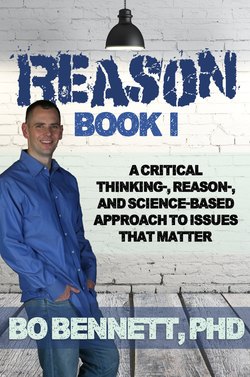Читать книгу Reason: Book I - Bo Bennett - Страница 9
На сайте Литреса книга снята с продажи.
“Common Sense” and “Intuitions” Often Contradict Reality
ОглавлениеWhat is generally referred to as “common sense” is a subjective sense of our own knowledge. In psychology, there is a phenomenon known as the Dunning-Kruger Effect, which is the illusion that we are smarter than we actually are based on the fact we lack the cognitive capacity to realize our own ineptitude. In fact, this is only one of the hundreds of known cognitive biases, or a deviation from rationality or reason, that virtually assure that our perception of reality is greatly skewed and often incorrect.
From an evolutionary perspective, these biases are a result of helping us pass on our genes. Evolution does not care if we are smart, logical, reasonable, rational, or even right—as long as our intuitions and “common sense” are more conducive to passing on our genes than they are a hindrance to that goal. The accurate information we do have as a result of the non-conscious and non-deliberate processes is obtained partly by genetics and partly by our environment. For example, it is “common sense” that we don’t want to jump off a cliff because our ancestors had a healthy fear of doing so... that is why they lived long enough to pass on their genes. It is “common sense” for us to look both ways before crossing a road not because of our primate ancestors, but because of learning in our current environment. Be careful not to associate all evolutionary tendencies with good common sense. For example, eating as much as you can at every opportunity might have helped our ancestors survive, but this tendency is sending us to our graves early.
Here are just some examples where “common sense,” “gut-feelings,” “intuitions,” and “our own understanding” are clearly at odds with reality:
•common sense tells us that the earth is flat (it’s not)
•common sense tells us the earth is the center of the universe (it’s not)
•common sense tells us the objects are solid (they are actually 99.9999999999999% empty space)
•common sense tells us that heavier objects drop faster than light ones (they don’t)
•common sense tells us that if we flip a fair coin 5 times in a row and it comes up heads, then tails is “due” (it’s not)
•common sense tells us that the winning lottery numbers “23, 5, 14, 34, 8, 38” are far more likely than “1, 2, 3, 4, 5, 6” (it’s not)
•common sense tells us that an airplane is too heavy to fly (it’s not)
•common sense tells us that time passes at the same rate everywhere (it doesn’t)
•... and virtually everything related to quantum mechanics, the most well-supported scientific theory every developed, is against common sense
It would be nice if we can just “know” things magically. In fact, the appeal to common sense is often based on a combination of laziness and a defense of our own intellectual limitations. The pain of not knowing something is reduced by simply thinking we know—and not just know but know better than those who spend their lives doing the work to really find out.
